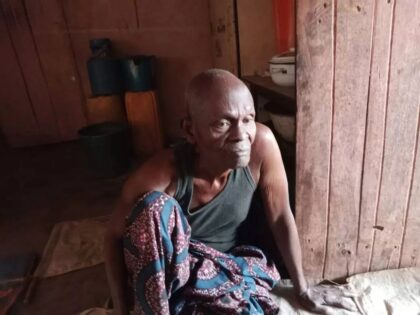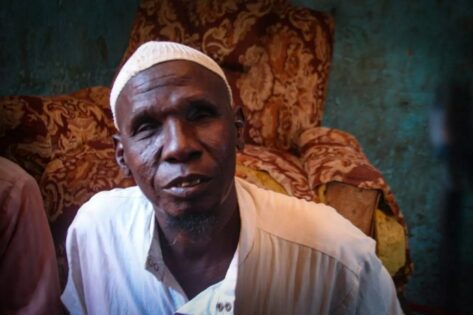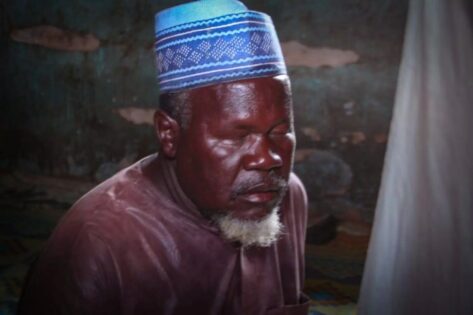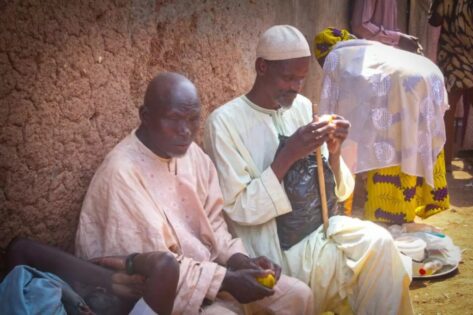How blind people are frustrated by INEC’s failure to provide Braille ballot
By Akewushola Afeez
When Muhammad Alhaji, a resident of Patigi in Patigi Local Government Area of Kwara state cast his vote in the 2019 general elections, he had to rely on one of his relatives who guided him in choosing candidates/parties of his choice.
Though blind, Alhaji exercised his right as enshrined in the constitution, but he still was unsatisfied and suspected that he might have been cheated.

Alhaji thought the person who assisted him to cast his vote might be supporting another party other than his own and could have made him cast the vote against his wish without his knowledge.

“Though he is my son and I trusted him, one of the implications of this is that if he is an APC member and I want to vote for PDP, there are 100 percent chances that he will put my hand in APC without my knowledge. Thus, for us blind voters, our votes might not reflect our intentions.”
He told Informant247 that “There was nothing like Braille ballot or any assistive technology for us in previous elections and I don’t think we will have such in subsequent elections – especially 2023. If they will provide it, we are supposed to have gotten the information and even training by now. But nothing yet.”
Read Also:Investigation: How Rep member, agency abandoned communities, siphoned project funds in Benue State
Alhaji added that “We are dissatisfied with INEC’s policy for people with disabilities. We have seen a lot of promises on paper; but there was nothing in actuality.”
At Gambari ward 1 and 2, Mallam Audu Suraju like Muhammed Alhaji was also assisted by his son to cast his vote and when he asked which party the son helped him choose, he didn’t get a satisfactory response.
The 65-year-old and visually impaired Audu, is a native of Kano State. He resides in Ilorin, the Kwara State capital. He has been living in Ilorin for over 2 decades. He did his voter card registration in Ilorin and always exercise his right during every election. He develops the voting attitude because he feels, it is his duty as a citizen of Nigeria who has the right to vote and be voted for.
Ibrahim Idris (Yerima Makarfi) also holds the same fear of being cheated while casting his ballot. “For over 10 years, I have been voting. My son does help me. But you know I can’t trust him because he may have a different choice from what I asked him to do for me. He is capable of doing what I wanted and at the same time changing my decision. Whatever he does is final”.

Ibrahim Idris Yarima Makarfi
The Nigeria National Blind and Visual Impairment Survey 2005-2007 puts the estimated number of sight problem at 0.78% or 1,092,000 people based on the then 140 million people in the country. About 15 years after, this figure might have doubled, in view of fast-growing nature of the country’s population.
Read Also:WASH takes a back seat as Kwara govt embarks on PHCs renovation
These people who also have the right to vote and be voted for, face challenges on election day as the electoral empire does not make provision for assistive technologies that could make voting easier.
‘Non-Provision of Braille ballots by INEC’
The electoral body had recognized the needs of the blind and the challenges they face on election days but had failed to take the appropriate steps to meet these needs.
For instance, Section 56 of the Electoral Amendment Act 2015, highlighted the guidelines for blind and incapacitated voters. It says, “A voter who is blind or is otherwise unable to distinguish symbols or who suffers from any other physical disability may be accompanied into the polling unit by a person chosen by him and that person shall, after informing the Presiding Officer of the disability, be permitted to accompany the voter into the voting compartment and assist the voter to make his mark in accordance with the procedure prescribed by the Commission.”
However, with the current pervasive syndrome of vote buying during elections, the fears expressed by Muhammed Alhaji and Surajo Audu of possibly being made to vote for candidates against their wishes by their guides may not be ruled out.

Mallam Audu Suraju
The only way out therefore according to the duo is the provision of assistive technologies at the polling units that would facilitate voting by themselves as contained in section 56 of the Electoral Act.
“The Commission may take reasonable steps to ensure that voters with disabilities are assisted at the polling place by the provision of suitable means of communication, such as Braille, Large embossed print or electronic devices or sign language interpretation, or off-site voting in appropriate cases.”
In May 2018, INEC Chairman, Prof. Mahmood Yakubu, promised that the commission would produce ballot papers in braille to allow visually impaired persons above the age of 18 to vote unaided in the 2019 general elections.
However, during the 2019 general elections, an investigation by Informant247 indicated that no Braille ballot guide was provided for blind people across polling units in the State. This according to Suraj is keeping more of the blind population away from voting.
The Informant247 was at Koro Afoju – a community in Ilorin, dominated by the blinds to investigate how INEC’s failure to provide the Braille ballot could affect the visually impaired persons from casting their vote in the next 2023 general elections.
The Chairman of the Association for the Blind in the area, Alhaji Ahmed Rufai, gave permission to grant interviews with his people. He assigned an interpreter who understands both Hausa and Yoruba languages to help ask questions and get feedback from the visually impaired persons.
As the atmosphere is already tense for the campaign and political rallies ahead of the much anticipated 2023 general elections, The Informant247 observed that the visually impaired persons and the blinds in that area were aware of what is going on around them. Although they cannot see they can sense what is happening in their community at every moment.
Those who spoke with the correspondent expressed dismay that it is only during the electioneering period that politicians visit them, sit with them, share money, feast together with them and find them relevant. They said the constant reception of politicians at their abode is an indicator that signalled them election is very near.
Voter apathy: ‘I have vowed not to vote again’
Saratu is a mother of three and registered voter in Kwara State. She begs for alms due to her condition. She feels cheated by the INEC system of voting and told The Informant247 that she has made up her mind not to vote again.
“In all the elections that had gone, we were assisted to vote. And this old system has frustrated me from voting. I feel I should be able to do my things without or with little help from people around. In the case of an election, I think the body coordinating it should find an alternative way to assist us to vote without third-party interference.
“I have vowed not to vote again until the body in charge of election changes the old way of voting. The old method does not give me the ample opportunity to vote for my preferred candidate,” she said.
When The Informant247 approached a group of physically impaired persons for an interview, at first they were reluctant to answer questions. They were just 8 people sitting together. They are all females and their children were rightly seated beside them. One of them who understands Yoruba helped the correspondent to relay the message to others. But despite that, they were speaking in Hausa language and were so loud in their discussion. The correspondent could not decode what they were saying, they were exchanging words and seemed aggressive in their discussions.
“Majority of our people won’t vote in 2023 elections”
When The Informant247 contacted the Public Relations Officer for the National Association for the Blinds, Ubong Udo, via a telephone call, he disclosed that the majority of the physically impaired persons would not be voting at the forthcoming 2023 general elections.

A group of blind people at Koro Afoju in Ilorin
According to him, the INEC has failed in the past to conduct fair and inclusive elections.
“In the wake of the 2019 general elections, the INEC invited us. They told us they will be introducing the Braille ballots which will help our people from voting without much interference,” he said.
“When we were in a meeting with them, we requested a sample of the Braille ballots so that we can use it to sensitize and educate our people before the election. We were of the opinion that prior knowledge about Braille ballots would help our people when it is time for the elections.
“But to our greatest surprise, INEC could not provide the Braille ballots. I am not even sure whether they have it, because of the way they were addressing us, we found out that the INEC officials did not know how the Braille ballots work. Despite all our efforts to get a sample for the specimen, the INEC officials bluntly refused to give us.
“Fast forward to the 2019 general elections, we read a claim by the INEC that the Braille ballots were provided in some polling units to assist blind persons. I can tell you that the claim was not true. When I reached out to some of the members across the country, I was able to gather that no Braille ballot was provided. Even in Akwa Ibom State where I used to vote, nothing was provided.
“I must be sincere with you, the majority of our people won’t vote in the 2023 general elections. Many of them have lost interest in voting. We say Nigeria is the giant of Africa and we are finding it difficult to provide an avenue for the physically challenged people to thrive.
“INEC said that they are practising secret balloting. To my own understanding, anything that is secret should not be revealed to anyone, not even your close relatives. Imagine a blind person being assisted by his wife or child, let me ask what is the secret there? Your choice is no longer secret when someone is doing it for you. If we say we are voting for party A and the person helping work against our wishes, how are we going to know?
“So, I must confess, our people are tired of the way INEC is handling the whole situation. I won’t be surprised if a larger percentage of us are not voting in the forthcoming 2023 general elections.
“My advice for the INEC is that they need to practice their usual claim of conducting credible, free and fair elections. In all honesty, INEC has not been fair to us. And under the 1999 Constitution, as amended, we also have the right to vote and be voted for.”
We will provide Braille ballots, educate the visually impaired persons: Kwara INEC REC
INEC’s Resident Electoral Commissioner in Kwara State, Mallam Garba Attahiru Madami, when contacted said the commission is ready to provide technology-assisted ballots to visually impaired persons at the 2023 general elections.
He added that the Commission will orientate the blind voters a month to the main election.
Speaking with The Informant247 in his office in Ilorin, Madami, said, “We are going to provide a Braille ballot and other technology-assisted devices for the visually impaired persons. Also, we will educate and sensitize them, a month before the general elections.
“Although we have not received any of their representatives, we are still expecting them to come to us so that we can schedule the sensitization exercise with them.”



Comments are closed.